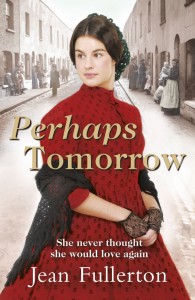The Original EastEnders
by Myfanwy Cook
 Jean Fullerton discusses her novels set in London’s East End
Jean Fullerton discusses her novels set in London’s East End
Jean Fullerton was born within the sound of Bow Bells and still lives in the East End of London – not far from the Olympic Park. Her third novel, Perhaps Tomorrow, was shortlisted for the 2012 RNA Historical Romantic Novel.
MC: Have you ever thought about writing about the 20th century in London’s East End and including links to the 1908 or 1948 games?
JF: The book I’m writing at the moment starts on 5th July 1948, the day the NHS came into being, and includes many references to the 1948 Olympics. The problem any author has writing real events in as background is deciding how much detail to include. In books dealing with immediate post-war period, such as Austerity Britain by David Kynaston, the 1948 Olympics are mentioned at some length in regard to their social significance to the moral of the country. However, if you investigate how ordinary people viewed them in the Mass-Observation Diaries you see a very different opinion. One entry gave a line to the King opening the event and five to the problem of getting the washing on the line between showers. Most people only talk about national events if they impact on them directly. If you don’t believe me, listen to people chatting over a coffee. I doubt you’ll hear them talking about the Euro crisis unless they’ve booked a holiday in Greece.
MC: Do you think that competitive sports like football played a part in the lives of the characters that you write about, or even your own ancestors?
JF: Absolutely! Up the Hammers! West Ham United football club was synonymous with Saturday afternoons from my earliest memory as all my family supported the team. I certainly feature the club in my next book, Call Nurse Millie. My character, Queen’s Nurse Millie Sullivan, is always dodging through the crowds of claret and blue to reach her patients. When I was a district nurse in Newham, there was many a Saturday afternoon in Upton Park when, trying to get to a patient, I found myself crawling behind coaches streaming away from the ground, so I know exactly how she felt. As West Ham wasn’t founded until 1895 it was too early to be included in my Victorian books, but as it, and the amateur league it played in, grew out of the Thames Ironworks Foundry, I imagine my character in my earlier stories kicked a ball about in the work’s yard.
MC: Your characters are all faced with a series of challenges; which is your favourite one and why?
JF: Although in A Glimpse at Happiness (Orion, 2009) Josie O’Casey had to battle with the odious Ma Tugman, I think the biggest challenge faced by any of my character was to Mattie Maguire in Perhaps Tomorrow. She had to face down the management board of the Wapping & Stratford Railway Company to expose the corrupt and depraved Amos Stebbins. It’s difficult to imagine today, but in 1847, when the story took place, women weren’t able to manage their financial affairs or sign a legal document without having a man to act as their man-of-business. Their inferior brains couldn’t cope with the complexities of accounts and finance it was thought!
MC: Do you think the changes made to the East End of London for the 2012 Olympics will inspire future generations of historical fiction writers?
JF: Well, as I wrote a story based amongst the filth and danger of building of the Thames Tunnel, I don’t see why in 100 years from now someone won’t use the building of the Olympic Park and the 2012 Games as the setting for a rip-roaring tale of adventure.
Details and background for Jean Fullerton’s novels are at www.jeanfullerton.com.
About the contributor: Myfanwy Cook runs historical and creative writing workshops. Her father’s ancestors all came from the East End of London and she still has ties with the area.
______________________________________________
Published in Historical Novels Review | Issue 61, August 2012






